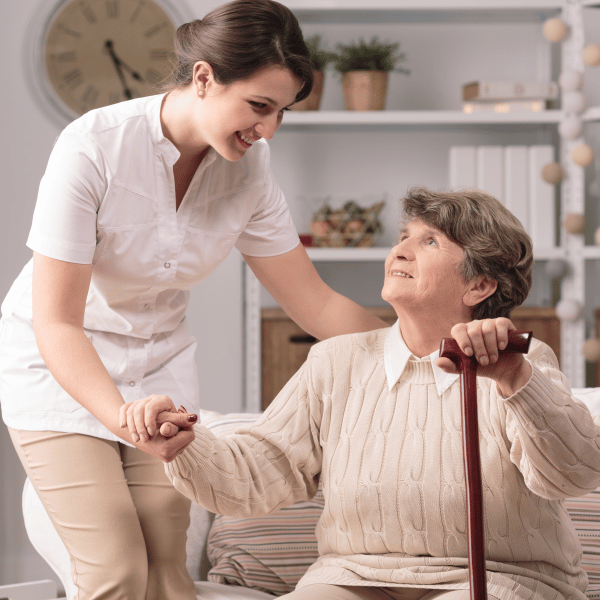There are lots of things that you need to learn and take on board when you work within any care setting. This could be working with the elderly, working with those who are disabled or working with vulnerable children.
It takes a certain type of person to be able to tackle care based roles. Whilst they should be naturally able to do this somewhat difficult working position, managers within a care setting can give their colleagues the right tools and knowledge to enable them to be even better at the job that they do.
Here at Learn Q we give you access to a range of courses that can ensure that those who work within care to keep themselves safe, those they are responsible for safe and those who they work with safe as well.
Some of these courses are a legal requirement, some are strongly recommended that you offer, and others are great to add and enhance the work that your teams are doing.
Mandatory
The best place to start is by learning which courses you must provide to the colleagues working within your business to comply with UK legal requirements.
We suggest that these courses are made a part of your onboarding process so that you can ensure that all New Starters go through the relevant training.
The main legislation that is applicable to care businesses are:
Mandatory courses for care businesses include:
As a part of the Care Quality Commissions legal requirements, the Care Certificate helps every colleague within your care setting how to provide the right level of care for those who need it and how the skills, knowledge and behaviours that create a compassionate care environment.
There is a good chance that those who are within the care system are also those who are going to be deemed as vulnerable. This is why the Safeguarding Adults Level 1 course should be offered to those who are in your care setting. It covers how to identify those who may most be at risk and also how to ensure that the right reporting procedure is followed.
Those with additional safeguarding responsibilities should take the Safeguarding of Adults Level 2. This course explains what safeguarding is, why safeguarding is important, recognising abuse, the responsibilities of different safeguarding roles, how to communicate effectively, and how to handle concerns and incidents related to safeguarding.
Alongside the Safeguarding Adults Level 1 we also offer the Safeguarding Children Level 1 course. This is designed to offer the same advice, albeit focused on protecting children rather than adults. This is most relevant to those who work in a care setting that is responsible for all ages, not just for those who are older.
Working in a school or a college means that you have a responsibility to keep the children that you work with safe. This should come naturally to many people who work within this setting, but it is still a requirement to provide all staff with relevant safeguarding training courses so they are familiar with the Children’s Act 2004 and know what to do if there is a safeguarding issue.
As outlined in the Health and Safety First Aid Regulations 1981 and Management of Health and Safety at Work Regulations 1999, employers should ensure the number of trained first aiders, first aid facilities and equipment at their workplace is adequate for the needs of the workplace. If your colleagues work on-site, ensuring they all take a health and safety course will help them to gain a deeper understanding of health and safety basics, the most common health and safety risks and how to avoid them, and the obligations of employers and employees. This will go a long way to helping you remain compliant, keep colleagues safe and prevent any legal action against your business.
No matter what type of care you provide, you need to be able to protect the sometimes vulnerable people that it is your job to look after. There are a variety of ways that you can do this and one is having the right training in order to act appropriately in certain circumstances. Such as fire.
This fire safety course gives you all the basics of fire safety and helps colleagues to understand what they need to do in the case of a fire whilst they are at work.
One key business compliance course is GDPR Awareness. This covers the regulations that were put in place to protect data that you may hold as a business. Not only this, but it also highlights the rights of clients as to what is done with their data and how it is handled.
Care homes will often have to deal with the NHS in a variety of ways. This means that colleagues need to be offered the NHS Counter Fraud training. This was introduced during 2021 and it covers standards and reporting for those who work with the NHS on a regular basis, relating to fraud, bribery and corruption too.
If you work in a caring role, then you need to ensure that you have an up to date DBS Certificate. Those who are responsible for this part of the recruitment process will need to understand as much as possible about the DBS process and why it is there. This training course covers who is eligible to apply for DBS and also how they can be applied for.
Within care, most of the time will be spent dealing with clients and their needs, which is away from a computer screen. However, there is also always a chance that there may need to be notes taken or other key things dealt with on a computer or other device. This is why DSE training is needed.
It covers the proper use of Display Screen Equipment, how you can protect yourself from any injuries and also what risks there are from regular use of DSE.
There is always a chance that those who are in your care are going to have catheters for a variety of reasons. Whilst your colleagues may not have to administer catheters themselves, they should always be aware of how to properly manage them and the best way to approach caring for a client who has a catheter.
It is thought that around 850,000 people in the UK are living with dementia and over the next few years this figure is going to rise and rise. There is always a good chance that those who work in care are going to have to deal with people with dementia in a variety of ways. Providing your colleagues with this Dementia Awareness training will give them the right tools to enable them to recognise how dementia needs to be dealt with and the right care levels for those who have dementia.
Working with people is a key part of working in care or retirement homes; and there is always a good chance that these people are going to be from all walks of life. We live in a world now where we all need to ensure that we not only recognise the positive in a diverse and equal world, but we also take active steps to ensure we meet this. A key outcome of this particular training course.
Another condition that is often found along with care is diabetes. This training course will help all colleagues to be able to deal with diabetes appropriately and protect those in their care who may be living with diabetes and need support to manage their condition.
A key part of any caring role is providing support with medication to the clients. This could be discussing what medication they need to take, arranging timings for this medication and managing the organisation of their medication too. This is why this training course is so important to provide as a part of the training for new starters in your care organisation.
Whilst other roles may require you to move objects around safely, when you work in a caring role you are going to need to know how to move and handle people around safely. Not only do you want to keep them safe, but also keep yourself and those around you safe too. This is where the Moving and Handling of People course is a vital one to offer anyone who works within your care organisation.
When someone is in care, there is always a risk that they may develop pressure sores. These sores can get worse and over time they can even become infected. Let alone cause a high level of discomfort and pain to those with the sores. When you are a carer, you need to be able to recognise how to deal with pressure sores and how to alleviate the pain that is felt as much as possible.
Whilst preparing or serving food might not be a key part of a care role, the truth is that it can form part of it. When you work with those who are vulnerable, you need to take extra care with the food that they eat. This is why it is important that you provide your care colleagues with food safety hygiene training to help them to identify the risks and what they can do to mitigate them.
There is always a chance that you may have to deal with any substances that could be hazardous to health when you are working in care. These can come in all different types, which means that you will want to provide those on site with COSHH Awareness training so that they know the part that they need to play in keeping themselves and everyone safe.
Bugs and illnesses are often part and parcel of working in a caring role. However, that doesn’t mean that you should just accept them and not try to limit their occurrence and spread. Offering all of those in your setting the Infection Control Awareness training course is a key part of ensuring that you reduce the impact of any impact within your setting.
Strongly recommended courses
Training is a key part of the development of every person who works within a care setting. It helps them to learn new skills, extend on existing skills and to be able to do their job to the best that they can.
As well as the mandatory courses that we are able to offer as a part of our catalogue of courses, we also have those that we feel are strongly recommended. They may not be a mandatory part of training and development, but they can still be useful and are important to offer.
As well as understanding the importance of health and safety in a care setting, you can also give your colleagues training on the main risks that are associated with this type of setting. This Health and Safety Risk Assessment course gives them an overview on how to ascertain what can be seen as a risk and the steps that it takes to perform a risk assessment.
RIDDOR stands for Reporting, Injuries, Diseases and Dangerous Occurrences Regulations. These are all things that can and do happen in care or retirement homes. This means that it is incredibly important to ensure that your colleagues now what needs to happen should any of these occur and the steps that need to be taken to prevent them happening in the future.
Around 37% of injuries that occur in a work place are related to slips, trips and falls. This can be even higher in some industries where the risks are greater. Just like care. This is why we believe that the Slips, Trips and Falls course is important to offer. It helps those who work with you to recognise the key risks and how to mitigate them too.
We don’t ever want to think that we will work in a place whereby harassment can occur, but it does happen. In fact, if it is witnessed, then it is important that we know what to do to ensure that it is dealt with in the right way and it doesn’t happen again. This Workplace Harassment course sets out to do just this and to provide colleagues of all types with the knowledge that they will need.
It is important that we all know how to keep ourselves protected whilst we are online. Not only is this important in our personal lives, but also in our working lives too. This training course will help your colleagues to understand more about cyber security, why it is important and how to make sure that we are all as secure as possible.
Many people who may require care are likely to have a disability of some sort. This means that your colleagues can really benefit from Disability Awareness training and how they can best approach caring for those who are disabled. Meeting not only their needs, but also ensuring that they are treated in a way that is dignified and fair.
This training course is designed to follow on from the Medication Awareness course and gives a more in-depth look at managing medication and making sure that the needs of the person that you are caring for are met, whilst also keeping them safe.
Soft skills are designed to help everyone to do their job as effectively as possible. They help them to manage their own time as well as deal with the clients and families of those that they care for.
We all hope that there won’t be any complaints when it comes to the care that people receive, however, from time to time there can be issues that come up. Being able to properly deal with them is important not only to reach a resolution, but also to do so with minimal stress for all parties. This Complaints Handling course helps your colleagues to learn more about how to deal with all kinds of complaints that they may come across on a day to day basis.
Recommended courses
As well as courses that you have to have, those that are a great idea to have, we also have our recommended courses too. These are designed to give you and your colleagues plenty of knowledge and information that can then be beneficial for them in their every day working life.
It also helps those who you care for and ensures that the entire team within your care home or residential home, all know how to work well together as one unit.
You are likely to have managers and leaders within your team and it is important that these colleagues have the skills that they need to ensure that they can be the best leaders possible. These leadership courses are designed to provide key colleagues with the knowledge that they need to be able to be top quality leaders (and then lead their teams to providing the best service possible).
One of the best ways that colleagues can learn more about how to improve their own ability is to know what they are doing right (and those things that they might not be doing as well). Staff appraisals may seem straightforward, but they can be one of the trickiest parts of being a manager. this training can help with this part of the management role and ensure that everyone is as happy as possible with the outcome of their appraisal meetings.
Another difficult part of being a manager is managing the people. Working in any care setting can be tricky, especially if you are managing a team. This is why we believe that this Managing People course is going to be a great way to make your managers jobs that little bit easier, giving them all the knowledge that they need to be seen as a good manager by those in their team.
No-one wants to think that conflict can happen at work, but it does, especially in high-pressure environments such as working in care. We provide this Conflict Resolution course to those in management and leadership roles to help them to be able to effectively manage an instances of conflict within their own team.
In any role it is all too common to feel that time has got away from us, however, in care, you need to make sure that you use every single second you have to the best that you can. This is where our Time Management Awareness course really comes into its own. It gives you the skills to understand and implement the approaches that help you to manage your own time as effectively as possible.
Working in care can be stressful and too much stress can take a toll on the mental health of anyone. This is why we offer the Mental Health Workplace course, designed to help your colleagues to learn how to take charge of their own mental health and be able to do their job as best that they can, without impacting on their mental wellbeing.
Along with the above we also have Stress Awareness, which looks at stress and how it can have an impact on your physical and mental wellbeing. It also provides key coping strategies when it comes to times of extreme or prolonged stress.
If you handle food, which you often do in a care role, then it is a good idea to have HACCP Awareness training. This protects those who may eat the food from illness and injury from eating the food and lowers the risk of people getting ill from what they have eaten.
You can offer your colleagues the chance to build on the Infection Control Awareness course by then taking the Infection Control Advanced course. Taking a look at this key part of care in much closer detail.
How often do colleagues need to take this training?
The answer to the question of how often the courses should be repeated is not always as straightforward as you may hope and there is not necessarily a set answer across all organisations. For many courses it will really depend on the type of course that is being taken and the nature of what you do. Ideally, the refresh regularity should be based on a thorough risk assessment of your business and tailored to the unique needs of your organisation and customers.
That said, if you are looking for a general rule, then we would say every 12 months is good practice for most of the courses that we offer
- In the case of an internal incident- if there has been an incident within your business where an employee, a customer or a client has been injured, then this then means that it is important to refresh all staff members with the relevant training in order to minimise the chance of it happening again.
- In the case of an external incident- if there has been an incident outside of your business but within your industry, then this could be a time to refresh relevant training. Of course, this will only be applicable if the incident is severe and you think that it poses a risk to your business and those who work within it and those who are clients. At the very least, it is going to be worthwhile refreshing their Health and Safety training.
- If a process changes- if an internal process has changed, then it is going to be a good time to refresh any training that relates to this process. Particularly if you feel that it might impact what has been previously learnt.
- If you bring in new equipment- if you bring in new equipment for your staff members to use, then you should provide them with training that is relevant to this change. Even if the change is slight, after all, prevention is always better than cure.
- If there has been a change in the environment- if you move premises or you have some changes made to where you work, then you will need to think about some of the training. This includes COSHH and Health and Safety.
To download a .pdf of this blog, please click here










